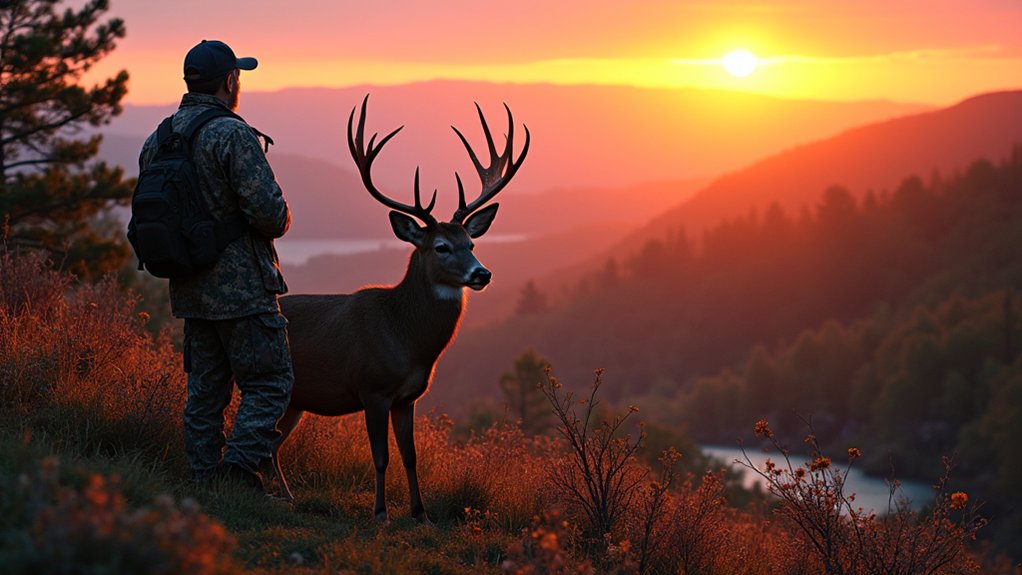Hunting and wildlife conservation might seem like opposing forces at first glance, but they actually intersect in significant ways. By understanding how regulated hunting contributes to ecological balance, you can see its role in population control and habitat preservation. Additionally, the economic benefits tied to hunting often fund essential conservation initiatives. So, what does this mean for the future of wildlife management and community engagement? Let’s explore these connections further.
How do wildlife conservation and hunting intersect?
While some may see hunting and wildlife conservation as opposing forces, they often intersect in meaningful ways.
When you engage in hunting, you contribute to funding conservation efforts through licenses and fees. These resources help protect habitats, support research, and maintain ecosystems.
Furthermore, regulated hunting can help control animal populations, ensuring that species remain balanced within their environments. By participating, you also foster awareness about wildlife issues, encouraging others to appreciate and protect natural resources.
Ultimately, your involvement in hunting can play an essential role in sustaining wildlife, demonstrating that these pursuits can coexist harmoniously for the greater good.
What role does hunting play in wildlife management?
Hunting plays an essential role in wildlife management by directly influencing animal populations and their habitats. By regulating species numbers, hunting helps maintain ecological balance.
Here are a few key ways hunting contributes to effective wildlife management:
- Population Control: It prevents overpopulation, mitigating issues like habitat degradation and food shortages.
- Funding Conservation: License fees and taxes from hunting gear fund conservation programs and habitat restoration.
- Public Awareness: Hunters often become advocates for conservation, promoting sustainable practices in their communities.
In these ways, hunting not only supports wildlife management but also fosters a deeper connection between people and nature.
Why is sustainable hunting important for conservation efforts?
Sustainable hunting is vital for conservation because it guarantees that wildlife populations remain healthy and ecosystems thrive.
By participating in regulated hunting practices, you help control animal populations, preventing overpopulation and habitat degradation. This balance is essential for maintaining biodiversity and ensuring that species don’t face extinction.
Additionally, sustainable hunting generates revenue that supports conservation initiatives, funding habitat restoration and wildlife protection programs.
When hunters engage responsibly, they become stewards of the land, fostering a deeper connection with nature.
Ultimately, your commitment to sustainable hunting practices contributes to the long-term health of wildlife and the ecosystems they inhabit.
How does hunting contribute to habitat preservation?
How does hunting play a role in habitat preservation? When you engage in hunting, you’re not just pursuing game; you’re actively supporting the conservation of natural habitats. Here’s how:
- Funding for Conservation: Hunting licenses and fees contribute to wildlife management and habitat restoration projects.
- Population Control: Regulated hunting helps maintain wildlife populations, preventing overgrazing and habitat degradation.
- Community Involvement: Hunters often advocate for land preservation, fostering local stewardship of natural areas.
What are the economic benefits of hunting for conservation?
While many people may view hunting solely as a recreational activity, it actually generates significant economic benefits that support conservation efforts.
Hunters contribute billions of dollars annually through licensing fees, taxes on equipment, and donations to wildlife programs. This funding helps maintain habitats, support research, and fund enforcement of conservation laws.
Additionally, hunting creates jobs in sectors like tourism, retail, and outdoor recreation, boosting local economies.
When you participate in hunting, you’re not just enjoying the outdoors; you’re also playing an essential role in funding initiatives that protect wildlife and their habitats for future generations.
How can hunting initiatives improve community engagement in conservation?
Hunting initiatives can foster a strong sense of community engagement in conservation by bringing people together around shared goals.
When you participate in these programs, you not only help wildlife but also strengthen community bonds. Here’s how hunting can enhance your involvement:
- Education: You learn about local ecosystems and the importance of sustainable practices.
- Collaboration: Working with other hunters and conservationists fosters teamwork and trust.
- Advocacy: Engaging in hunting initiatives empowers you to advocate for wildlife protection and sustainable land use.
Involvement in hunting initiatives makes conservation a communal effort, creating a lasting impact on both wildlife and your community.
What challenges face hunting as a tool for wildlife conservation?
Though hunting can play an essential role in wildlife conservation, it faces several significant challenges that can undermine its effectiveness. Misunderstandings about hunting often lead to negative public perceptions, making it harder to gain support for conservation efforts.
Additionally, illegal poaching and overhunting can threaten wildlife populations, overshadowing the positive impacts of regulated hunting. Conflicts between hunters and non-hunters can create divisions within communities, weakening collaborative conservation initiatives.
Finally, changing regulations and diminishing habitats can hinder hunters’ ability to contribute effectively. Addressing these challenges is vital for ensuring hunting remains a viable tool for wildlife conservation.
How to support responsible hunting practices for effective conservation?
To support responsible hunting practices that enhance wildlife conservation, it’s essential to promote education and awareness among hunters and the general public.
You can make a difference by engaging in the following:
- Participate in workshops: Join local events that teach sustainable hunting techniques and conservation principles.
- Advocate for regulations: Support policies that manage wildlife populations and protect habitats.
- Support conservation organizations: Donate or volunteer with groups that focus on wildlife preservation and responsible hunting advocacy.
